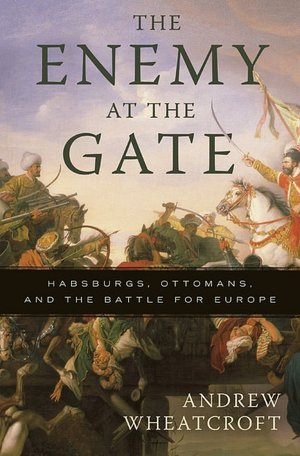I am about half way through The Enemy at the Gate: Habsburgs, Ottomans, and the Battle for Europe by Andrew Wheatcroft. It tells the story of the Ottoman siege of Vienna in 1683. The Ottoman Sultan, whose position was inherited from his ancestors, was supported by an aristocracy, again based on heredity, and believed that he had the right to set his people at war to gain territory for the Ottoman empire, with his troops killing and enslaving people simply because they lived in newly conquered territory and professed the wrong religion. The Habsburg Holy Roman Emperor, whose position was inherited from his ancestors, was supported by an aristocracy, again based on heredity, and also believed that he had the right to set his people at war to gain or protect previously conquered territory for the Habsburg empire. How strange that any people would allow their leadership to be so based and so used!
Of course most of the world has progressed past the belief that political leaders rule by divine right, and indeed most of the world has progressed past the belief that military conquest of another people gives the conquering people rights to rule them. The following quotations illustrate the progress
We hold these truths to be self-evident, that all men are created equal, that they are endowed by their Creator with certain unalienable Rights, that among these are Life, Liberty and the pursuit of Happiness.--That to secure these rights, Governments are instituted among Men, deriving their just powers from the consent of the governed, --That whenever any Form of Government becomes destructive of these ends, it is the Right of the People to alter or to abolish it, and to institute new Government, laying its foundation on such principles and organizing its powers in such form, as to them shall seem most likely to effect their Safety and Happiness.The United Nations was established, according to its Charter:
Declaration of Independence
- to practice tolerance and live together in peace with one another as good neighbours, and
- to unite our strength to maintain international peace and security, and
- to ensure, by the acceptance of principles and the institution of methods, that armed force shall not be used, save in the common interest, and
- to employ international machinery for the promotion of the economic and social advancement of all peoples,
Too bad that the leaders of some nations still feel, and have the support, to dominate their nation's own people by force and to hold once conquered people by force. Too bad that the leaders of some nations feel that even if they do not have the right to put their nation's military to conquer other peoples to steal their land and wealth, they do have the right to change the other peoples legitimate government by force.
I visited the Capitol and the Supreme Court last week. They were explicitly designed and built to convey the grandeur of the conception of the federal government of the United States. Then I visited the Baltimore Museum of Art's display of early American furniture, furniture which was obviously chosen to display the relative affluence and importance of the families that purchased and displayed it in their homes. Those 18th and 19th century homes were modest in comparison with the palaces of the European monarchs of the time, or even of the wealthy European aristocrats, but showed in their own way a pride of possession and place. I found myself wondering if it would not be better to have more modest tastes in both public building and private property. Would we be more modest in our political aspirations and thus more peaceful in our foreign policy.
 |
| The U.S. Capitol |

No comments:
Post a Comment